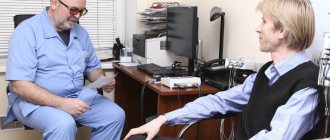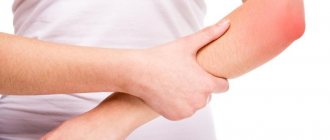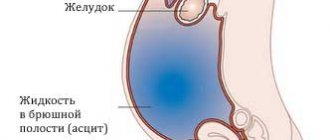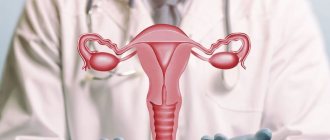What is stomach pain
Pain in the stomach area is called gastralgia.
It can be caused by many factors. These include serious pathologies of internal organs and minor temporary ailments, for example, after eating too much. Pain in the stomach is easily confused with unpleasant sensations in other organs located in the abdominal cavity and retroperitoneal space:
- small and large intestines,
- kidneys,
- appendix,
- spleen,
- gallbladder,
- liver,
- pancreas.
Often, stomach pain is accompanied by other symptoms of gastrointestinal disorders - nausea, vomiting, diarrhea.
How does my stomach hurt?
To determine that it is the stomach that hurts, you need to understand its anatomy. The stomach is located in the abdominal cavity just below the diaphragm. Its shape and size constantly change depending on the amount of food eaten. The largest part of the organ is located on the left directly under the ribs, and the smaller part is located immediately under the sternum (Fig. 1). This area is called the epigastric region.
Figure 1. Where is the stomach in the human body. Source: MedPortal
Adjacent to the posterior wall of the stomach are the pancreas, spleen and the upper part of the left kidney.
Pain in the stomach is usually localized in the upper abdomen - the epigastrium, but in the same area pain can appear with pancreatitis, cholelithiasis, and even with myocardial infarction and aortic aneurysm (Fig. 2).
Figure 2. Cause of pain depending on location. Source: MedPortal
Acute and severe “dagger” pain is characteristic of perforation of a stomach ulcer and peritonitis. In case of indigestion, the pain is localized on the left under the ribs; a sign of chronic gastritis with low acidity is pain in the middle of the abdomen; if the body of the stomach is affected, complaints are associated with painful sensations above the navel.
But the localization of pain is not an unambiguous sign of stomach diseases. For example, pain in the left side of the abdomen often occurs with osteochondrosis and cardiovascular pathologies. In women, such pain can appear due to pathologies of the ovaries and uterus.
The most likely sign of stomach problems is pain that appears after eating or during a long break between meals. But even in this case, its cause can be established only after a comprehensive examination.
Prevention
These rules should be followed by all people who experience pain in the left lower abdomen:
- control your stress and its level. To do this, you should meditate and do stretching exercises. Very often, stomach problems arise due to stress. Stretching, meditation will relax the body, mind, reduce pain in the left abdomen;
- Exercise regularly if your stomach hurts on the lower right side. Thanks to constant exercise, constipation is prevented and metabolism is accelerated. In addition, sport helps strengthen the digestive tract, cleanse the intestines, and ensure efficient functioning of the stomach;
- fill out a food diary. Write down all the dishes you ate throughout the day there. This will help you understand why your stomach hurts. You can prescribe your diet for a week, and it is important to indicate even the amount of food consumed. You should also write down your feelings during abdominal pain in your diary (the nature of the pain, their duration);
- watch your weight. Just because you're overweight and not much of it, doesn't mean you can forget about heartburn. Scientists say that the layer of fat puts pressure on the stomach, causing gastric juice to rise into the esophagus, and this guarantees heartburn;
- drink more water if your stomach hurts (about 2.2 liters). To have regular bowel movements and digest food, you need to drink enough liquid. Otherwise, hemorrhoids, polyps, and painful constipation are possible;
- get plenty of rest. If there is a stomach virus in the body, then you should be at peace and have strength. In the case of acid reflux, lack of adequate sleep can lead to serious consequences.
Why does my stomach hurt?
Stomach pain can be caused by situational reasons that do not threaten human health, and by very serious pathologies of internal organs.
Situational factors include:
- Flatulence (bloating) is a condition in which gases accumulate in the stomach, distending the organ from the inside and causing pain. The accumulation of gases is usually associated with poor nutrition and a sedentary lifestyle.
- Constipation. The causes of constipation are mainly associated with eating large amounts of fatty foods and baked goods, a lack of fresh fruits and vegetables in the diet, and physical inactivity.
- Premenstrual syndrome often causes pain that is similar in nature and location to stomach pain.
- Irritable bowel syndrome and other functional disorders of the digestive tract.
- Sprains during pregnancy.
Pain caused by situational factors is temporary and goes away fairly quickly without the help of a doctor or taking medications. Prolonged pain is a signal indicating serious health problems.
Diseases that cause stomach pain:
- Gastritis is an acute or chronic inflammation of the gastric mucosa, the most common cause of pain. The disease is most often caused by the bacterium Helicobacter pylori. Exacerbation of pathology and severe pain in the stomach can be associated with improper eating behavior, nervous strain, and taking certain medications.
- Stomach and duodenal ulcers occur against the background of chronic gastritis, problems with blood supply to the gastric mucosa and some other diseases. The ulcer manifests itself as pain in the stomach during long breaks between meals and at night (hunger pain).
- Pancreatitis is inflammation of the pancreas. Pancreatic juice secreted by the gland neutralizes hydrochloric acid. If there is insufficient juice production, the acid irritates the gastric mucosa, causing pain.
- Crohn's disease is a chronic inflammatory process in all parts of the intestine.
- Cholecystitis is inflammation of the gallbladder. Disturbance in the process of bile outflow is one of the causes of inflammation of the gastric mucosa and pain.
- Damage to the gastric mucosa by the bacterium Helicobacter pylori and other types of pathogenic microflora. Gastritis and stomach ulcers often develop as a result of infectious diseases of the digestive system.
- Stomach tumors of any etiology. Severe pain is one of the symptoms of stomach cancer, but it can also be caused by benign formations - polyps, lipomas, neuromas and others.
Pain can also be caused by diseases not related to the stomach itself: acute appendicitis, colitis, spasm of the diaphragm, thrombosis of intestinal vessels, coronary heart disease and others (Fig. 3).
Figure 3. Causes of pain in the upper and lower abdomen. GERD is gastroesophageal reflux disease. Source: verywellhealth.com
Stomach pain in women
Women often experience stomach pain during pregnancy for various reasons.
Firstly, due to an increase in progesterone levels, the intestinal muscles relax, and the time it takes for food to pass through it increases, which leads to flatulence. Secondly, the uterus, increasing in size, puts pressure on the digestive organs, slowing down the process of food digestion. During pregnancy, stomach pain can also be associated with constipation, the causes of which are hormonal fluctuations, insufficient physical activity, nervous tension, and dietary habits.
Acute pain in the stomach in women can be a signal to immediately call an ambulance, as its cause can be an ectopic pregnancy, preeclampsia, miscarriage and placental abruption.
Types of stomach pain
Stomach pain varies significantly in nature and intensity depending on the causes that caused it. An accurate description of the pain syndrome greatly facilitates the diagnosis of pathology. But it must be remembered that the same factor can cause pain of varying intensity and nature. Our test will help you understand the causes of your own pain.
Acute pain
Acute severe cramps in the stomach are a sign of the development of a pathological process.
The attacks usually pass quickly, but recur after a short period of time. The intensity of pain attacks depends on the degree of damage to organs and tissues. Acute pain requires immediate consultation with a doctor, as the causes that cause it can lead to a tragic outcome. This symptom is typical for:
- acute gastritis,
- poisoning with food, chemicals and toxic substances,
- infectious damage to internal organs,
- peptic ulcer,
- acute pancreatitis and cholecystitis,
- acute appendicitis.
Acute stomach pain is often accompanied by nausea and vomiting. In addition to stomach diseases, acute epigastric pain can be caused by pulmonary pathologies, diseases of the diaphragm, cardiovascular system, in particular myocardial infarction.
Self-medication for acute stomach pain is contraindicated; the diagnosis can only be made by a doctor after a full examination.
Strong
Severe pain occurs with acute gastritis, irritable bowel syndrome, poisoning, stomach and duodenal ulcers, and acute pancreatitis.
To correctly diagnose the causes of severe pain, the presence of accompanying symptoms is important. Nausea and vomiting are signs of acute gastritis, poisoning, biliary colic. Peptic ulcer disease is accompanied by heartburn and sour belching, irritable bowel syndrome - diarrhea and flatulence.
The intensity of pain is a rather subjective sensation, so a full examination is necessary for a correct diagnosis.
Sharp
Sharp pain may be a sign of aggressive chemicals entering the stomach, such as acids or alkalis. Spoiled food also causes burns to the gastric mucosa.
Such pain in the area above the navel is a symptom of acute appendicitis. In addition, sharp pain sometimes occurs with neoplasms in the stomach and pancreas, with complications of peptic ulcer disease, when adhesions develop in adjacent tissues.
cutting
A dull cutting pain is characteristic of acute pancreatitis. If the pain covers the entire abdomen, and severe pain is felt in the epigastric region, then with a high degree of probability it can be assumed that the ulcer has perforated. Any movement in this case causes increased pain, so the person takes the “fetal position”, bending his knees and pressing them to his chest.
Cramps in the stomach can be triggered by taking certain medications, for example, non-steroidal anti-inflammatory drugs and antipyretics.
Aching
Aching pain after eating is a sign of increased acidity of gastric juice. Such pain often occurs due to indigestion, poor diet, or eating too much food.
The cause of aching pain may be chronic gastritis, a stomach ulcer outside the period of exacerbation, infection or a malignant tumor. The stomach aches after alcohol abuse, overeating, or eating stale foods.
Pulling
Nagging pain often occurs in pregnant women due to pressure on the digestive organs by the increasing size of the uterus. Similar sensations are familiar to most nursing mothers. Such pain can also occur with gastritis and cholecystitis.
Constant pain
Constant pain is often present with advanced gastric cancer. Such complaints also arise with advanced gastritis, stomach ulcers and other inflammatory diseases. Constant pain in the stomach can be a consequence of prolonged stress, alcohol abuse, or poor diet.
Periodic pain
Periodic pain may not be associated with gastric pathologies and go away without medical intervention. Sometimes abdominal pain occurs after eating unusual food, with bloating or constipation.
Pain before eating
Pain after a long break from eating is characteristic of a duodenal ulcer. Also, if pain occurs on an empty stomach, one can assume the presence of an inflammatory process on the mucous membrane - gastritis or gastroduodenitis.
Nausea and pain
The combination of such symptoms is typical for food poisoning, taking large doses of alcohol, and consuming fatty foods. Nausea and stomach pain often bother women in the first trimester of pregnancy. A similar condition can occur due to stress and certain neurological disorders.
Night stomach pain
Most often at night, the stomach hurts due to irritation of the mucous membrane with hydrochloric acid and pepsin, an enzyme of gastric juice. Night pain can be a consequence of overeating during dinner, prolonged stress, excessive physical activity and inflammatory processes in the stomach.
Stomach pain due to coronavirus
Stomach pain is not a typical symptom of COVID-19, but in rare cases, problems in the digestive system begin when the virus enters the body through the oral-fecal route.
About 10% of those infected experience nausea, vomiting, diarrhea and stomach pain. In isolated cases, the disease occurs with symptoms similar to those of serous peritonitis. Stomach pain with coronavirus is typical for young patients.
Treatment
Help before diagnosis
For moderate stomach pain, non-drug treatment is indicated. To reduce the load on the digestive tract, fried, spicy, and fatty foods are excluded from the diet. To reduce irritation of the mucous membranes, you should avoid strong coffee, spices, and carbonated drinks. You need to eat small portions 5 times a day, chew each piece thoroughly.
In case of acute gastritis caused by poisoning, it is necessary to rinse the stomach as soon as possible. To bind and remove remaining toxins, sorbents based on activated carbon, silicon dioxide, and silica gel are used. If a person has very severe pain, vomiting with blood streaks, or tarry stools, you should immediately consult a doctor.
Conservative therapy
Most cases of pain in the stomach are associated with organic pathology, which requires individually selected etiotropic and pathogenetic therapy. In case of drug-induced lesions of the gastric mucosa, it is necessary to discontinue the drug causing unpleasant symptoms. For the treatment of the underlying disease and relief of symptoms, the following is prescribed:
- Antisecretory agents
. Proton pump inhibitors and histamine H2 receptor blockers are the main drugs for the treatment of hyperacidity. They inhibit the formation of hydrochloric acid and eliminate its irritating effect on the damaged mucous membrane. - Antacids
. The action of the medications is aimed at quickly neutralizing the acidity of gastric juice. They eliminate pain from gastritis and peptic ulcers. Non-absorbable antacids, which have a long-lasting effect, are preferred. - Antispasmodics
. Medicines quickly relieve pain by normalizing the tone of muscle fibers and sphincters. They are used as symptomatic therapy to relieve severe pain that is not eliminated by other drugs. - Prokinetics
. They are taken to eliminate pathological spasm or atony of the muscular lining of the stomach and its sphincter apparatus. They accelerate the movement of food through the gastrointestinal tract and stimulate active intestinal motility. - Enzymes
. Replacement therapy is recommended for concomitant diseases of other digestive organs. Pancreatic enzymes speed up the digestion of food and prevent the processes of fermentation and putrefaction in the intestines. - Gastroprotectors.
They protect the gastric wall from damaging influences and promote the regeneration of the mucous membrane. For this purpose, enveloping drugs, group E prostaglandins, are prescribed, which increase the level of protective factors in the stomach.
If pain in the stomach is not caused by gastrointestinal pathology, the patient is treated by doctors of relevant specialties - a cardiologist, a neurologist, a psychiatrist. Taking into account the disease, such patients are advised to take antianginal and antiarrhythmic drugs, sedatives, and antidepressants.
When to see a doctor?
Any pain in the stomach requires consultation with a gastroenterologist, but in some cases it is necessary to immediately call an ambulance (Fig. 4). You should immediately consult a doctor if you have the following symptoms:
- severe pain after injury;
- heat;
- bloody stools;
- constant nausea and vomiting;
- sudden weight loss;
- yellow skin;
- pain when touching the stomach.
Figure 4. When stomach pain is a medical emergency.
Source: MedPortal Important! Stomach cancer often, although not always, is accompanied by specific symptoms:
- Rectal bleeding, traces of blood in the stool,
- Persistent lack of appetite,
- Unexplained weight loss
- Fatigue,
- Heat,
- Anemia.
Diagnostics
Diagnosis is aimed at finding out the causes of stomach pain and identifying the underlying disease.
First of all, the gastroenterologist collects anamnesis, finding out:
- localization of pain - the entire abdomen or limited to a certain area;
- the nature of the pain - stabbing, cutting, constant, periodic, etc.;
- when the pain appears: in the morning or evening, before or after meals, duration of the attack, connection with alcohol or certain foods;
- does the pain radiate to other organs;
- what medications are taken;
- is there any pregnancy;
- whether there were abdominal injuries.
Depending on the medical history, instrumental and laboratory research methods are prescribed:
- Ultrasound of the abdominal organs;
- endoscopy of the stomach;
- radiography;
- pH-metry;
- stool analysis.
How to treat
Therapy for stomach pain is aimed at treating the underlying disease.
Conservative treatment includes relief of symptoms, pain relief and removal of toxins.
Surgical treatment is prescribed if there is no effect from taking medications and if malignant tumors are detected.
First aid for stomach pain
If you have stomach pain, it is better to stop eating for a while and lie down quietly.
You should not immediately take painkillers, as they can irritate the mucous membranes and aggravate the condition. If you have stomach pain:
- replace food with warm drinks and low-fat broth;
- you need to lie down, pressing your knees to your stomach as much as possible;
- place a cold towel on your stomach;
- massage your stomach in a circular motion;
- in case of poisoning, take activated carbon or other absorbents;
- drink as much plain, clean water as possible.
Seek medical help as soon as possible.
Drugs
The choice of medications is determined by the cause of stomach pain. The doctor may prescribe:
- antisecretory agents that reduce acidity;
- antacids that neutralize the stomach environment;
- antispasmodics to relieve pain;
- prokinetics to stimulate intestinal motility;
- gastroprotectors to protect the gastric mucosa from aggressive influences.
Only a doctor can select a treatment regimen based on the results of the examination.
Diet
Any pain in the stomach requires a gentle diet. There is no need to force yourself to eat if you have no appetite.
You should eat regularly, avoid spicy, smoked and fried foods, do not eat too hot food, and be sure to have breakfast. The best foods for stomach pain are bananas, rice, applesauce, and toast (Figure 5).
Figure 5. Diet rules for stomach pain. Source: MedPortal
Folk remedies
For stomach pain, decoctions and infusions of berries and vegetables help well:
- gooseberry infusion (pour a few glasses of water over the berries and boil for 15 minutes, drink every 2 hours),
- potato juice (three times a day before meals),
- rowan infusion (one tablespoon before meals),
- white cabbage juice, cucumber, pomegranate, quince juice (drink before meals),
- decoction of crushed oats,
- rye bran infusion,
- dandelion syrup,
- infusion of dill seeds,
- white mistletoe decoction.
Pharmacies offer a wide range of herbal teas to normalize stomach function, but before using any herbal remedy, you should consult your doctor.
List of popular pills
Analgesic and antispasmodic drugs to relieve pain and spasm:
In Injections:
"Ketorolac" , " Ketorol " (one active ingredient) is an anti-inflammatory drug with an effective analgesic effect. It is used for severe and moderate pain, and has moderate antipyretic properties.
Price 50-100 rubles, release form: tablets and ampoules.
"Baralgin " is a non-narcotic analgesic, a strong antispasmodic. Suppresses intense attacks that are not controlled by other drugs for biliary, renal and intestinal colic.
Price: from 200 rubles Release form: ampoules.
In tablets:
“Spazgan” is a combined analgesic and antispasmodic, indicated for use in biliary, intestinal, and renal colic, spasms of the bladder, and chronic colitis.
Price: 100-150 rub. Release form: tablets.
“NO-SPA” is an antispasmodic agent that relieves spasms associated with diseases of the biliary system, urinary tract, ulcers, gastritis, and pathologies of the pylorus.
Price: from 60 rubles (6 pieces) Release form: tablets/ampoules.
"Xefocam" is an analgesic, anti-inflammatory drug. A medicine that has a strong anesthetic effect.
Price: from 137 rub. Release form: tablets and injections.
Trimedat. Release form: tablets. Antispasmodic acting on the muscles of the gastrointestinal tract.
For Pancreatitis:
To relieve pain in pancreatitis, use Drotaverine, Platyfillin (injections, tablets), glucose-novocaine mixture (iv drip), Gordox and Contrical (iv, drip).
Overeating, poisoning, flatulence:
“Mezim” – normalizes the functioning of the gastrointestinal tract when eating fatty and heavy foods, eliminates flatulence and bloating. Price From 79 rub.
A pancreatic enzyme that aids digestion. "Panzinorm-forte". You can also use Pancreatin.
Price: 115-200 rubles Release form: tablets.
"Smecta" - will help with diarrhea, bloating, heartburn. Price from 140 rub.
“Polysorb” is an enterosorbent that reduces intoxication of the body in case of poisoning. From 140 rub. in the bank.
“Activated carbon ” is a sorbent that relieves intoxication. Price 10-30 rub.
Heartburn, Gastritis, increased acidity:
To eliminate discomfort due to increased acidity and severe irritation of the esophageal mucosa, you can take antacids. Antacids are drugs that reduce acidity in the stomach, neutralize gastric juice, soothe the epigastrium, and eliminate heartburn and pain. These include: “ Almagel ”, “Rennie”, “Gastal”, “Rutacid”, “Ranitidine”, “Omeprazole”.
Also, an effective remedy will be Bellastesin, a combination drug that relieves spasms of the intestines, bile ducts and discomfort in gastritis with high acidity.
People often ask the question: which drug is most effective for stomach pain? In tablets, doctors recommend “ No-shpu ” - a combined analgesic and antispasmodic. Recommended for biliary, intestinal, renal colic, bladder spasms, chronic colitis. In injections, " Baralgin ", if taking the medicine in tablets is impossible or ineffective.
All of these drugs have contraindications and side effects. Therefore, their use is allowed only after consultation with a doctor, taking into account the person’s medical history and allergic reactions.
Digestive enzymes (Mezim, Pancreatin, Festal, Pangrol, Penzetal, etc.) are not used for acute pancreatitis or exacerbation of chronic pancreatitis. By activating the pancreas, they prolong the inflammatory process. Considering that a gentle diet is indicated for this condition, outside help for the digestive system is not required. Taking enzymes is possible when the exacerbation subsides.
Victoria Druzhikina
Neurologist, Therapist
Types of drugs
| View | Why do they take it? |
| Antispasmodics | Relieves spasms of smooth muscles of the stomach and other organs, and affects the cause of the spasm. Relieves pain from various spasms of the gastrointestinal tract and urinary tract. |
| Analgesics | They simply anesthetize, blocking nerve impulses, without affecting the cause of the spasm. |
| Antacids | Reduces stomach acidity when it is elevated. Neutralizes gastric juice. Effective for heartburn, ulcers, gastritis. |
| Proton pump blockers | Reduces the amount of stomach juice. Produced on the basis of Omeprazole. |
| Gastroprotectors | Protection of the gastric mucosa from external influences. |










